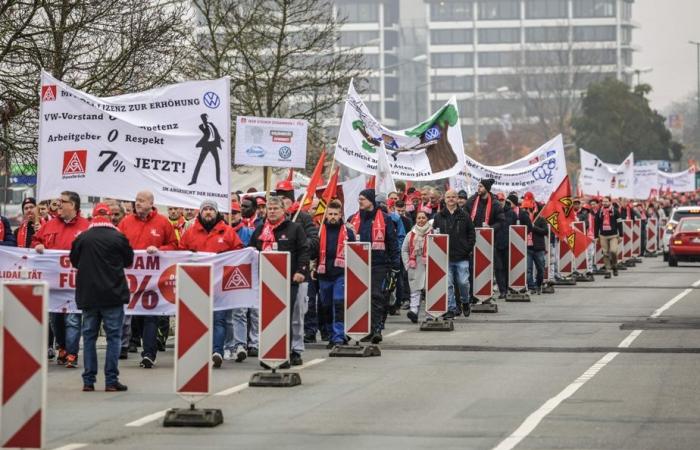(Frankfurt) The Volkswagen group will trigger a social conflict on an unprecedented scale in Germany if it maintains its plan to close factories, staff representatives warned on Wednesday, on the eve of a new negotiation session with the direction.
Posted at 7:46 a.m.
Without renouncing its “maximum positions”, the group would take “the responsibility of dragging us into a social conflict such as this republic has not known for decades”, threatened Thorsten Gröger, negotiator of the IG Metall union, during a press conference.
Staff representatives and the leading European manufacturer have been negotiating for several weeks a drastic savings plan to reduce the group’s production costs in Germany and restore its flagging competitiveness.
Strikes are possible at Germany’s largest industrial employer after a period of mandatory social dialogue, starting in December.
A social conflict would come at the worst time, “in a situation of geopolitical crisis, economic weakness, a government without a majority and an industry in a transformation such as we have hardly experienced,” added the trade unionist.
The crisis at Volkswagen is emblematic of the difficulties of German industry, the weakness of which is shaking the entire economy of the country, in addition to an uncertain political situation since the breakup of Olaf Scholz’s coalition at the beginning of November.
At the end of October, the group’s management unveiled a plan to reduce salaries by 10% and a review of the bonus system, which would allow it to achieve part of the billions in savings targeted to restore its competitiveness.
IG Metall says it is ready to negotiate if Volkswagen renounces outright layoffs and factory closures, which would be a first in the group’s history.
During the press conference, the union and the works council presented a “future plan” according to which employees and members of management would temporarily give up part of their bonuses and salary increases, in exchange for a reduction in working hours, to respond to the problems of overcapacity in certain factories.
This program would save 1.5 billion euros (2.22 billion Canadian dollars), the unions explained, a sum still far from the billions deemed necessary by management.
Like its European competitors, Volkswagen is suffering from the drop in global demand, especially for electric vehicles, and most of its factories have reduced their production rate.






